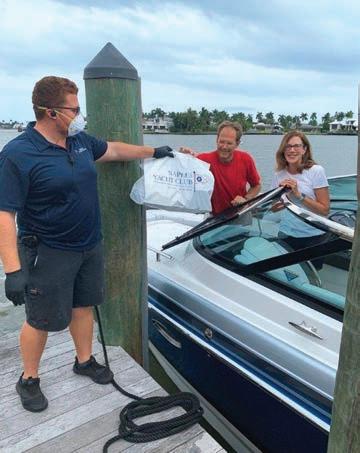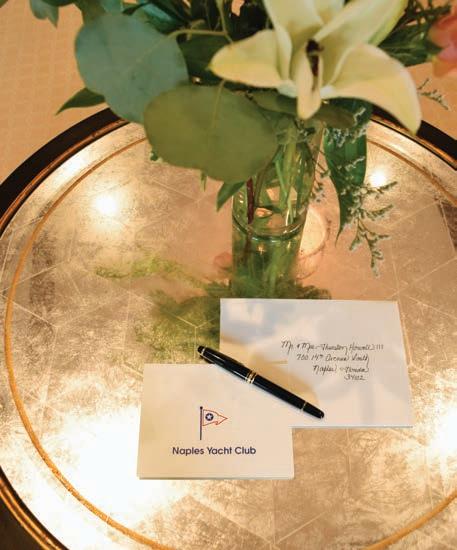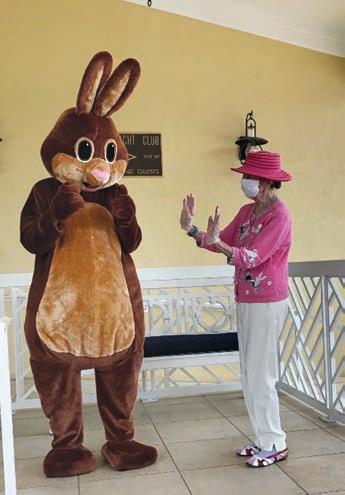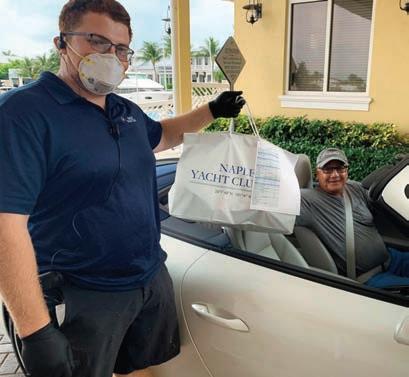
5 minute read
Weathering the Storm
Naples Yacht Club staff has rallied to fulfill members’ needs since the pandemic’s onset
Naples Yacht Club was at the height of a rollicking season—kicked off by the Welcome Back Gala celebrating the grand clubhouse renovations—when the coronavirus pandemic slammed the brakes on the remainder of the year’s social activities.
By early April, NYC quickly pivoted oper ations and strategized ways to provide extra TLC for members. “We have to give members the Club on their terms. We had the realization that members really are depending on us to keep their space open for them,” says general manager Mike Mooney. These are a few of the ways staff rose to the challenge:
Meet You at the Dock As New England states began grappling with high infection rates, many seasonal Naples residents decided to stay put. Many NYC members continued to seek freedom on the water, so NYC’s marina stayed open to provide fuel and docking assistance. The hours of

operation were shortened to 8 a.m. to 4 p.m., with only one staff member on duty to reduce potential contacts. NYC also discontinued reciprocal boater visits until early June “so it was only our members in the harbor,” says Mooney. “When the rest of the Club was shut down, and some other private marinas were closed, our harbor was still open. We wanted to keep some level of service for members who wanted to get on the water. There were a lot of them—and they appreciated it.”
Conscious Communication While some clubs sent daily emails with ever-shifting updates, the NYC team decided not to bombard members with “white noise,” says Mooney, so the team sent out one weekly, comprehensive missive. “Our members told us they liked how concise we were and what we were telling them,” he says.
A Special Touch: Handwritten Notes Each of the Club’s 550 members received a personalized, handwritten note in the pandemic’s early days. The effort was launched by Brenda O’Connor, executive director of membership, who divvied up members among staff. “Note-writing is kind of a lost art,” says Mooney. “I had so many people comment that they really appreciated getting a note from the Club. It made me realize that you can send emails all you want but taking time to write notes is really meaningful.”

Weathering the Storm

Party Parade May heralded an annual birthday celebration for three Past Commodores—Phil Francoeur, Bob Cornog, and Don Wingard—and member Bob Wilson. And the long tradition of feting

it together couldn’t be thwarted. The birthday boys and their wives, Jane Francoeur, Ginger Cornog, Diana Wingard, and Marie Wilson, met with a couple of other friends in the north NYC parking lot for a brief, outdoor COVIDstyle party, featuring bouquets of balloons festooning their convertibles. The parking-lot party culminated with a parade through Port Royal and old Naples, with the car caravan being led by Wingard, whose name was drawn out of a hat to do the honors.
Connecting Virtually For the Speaker Dinner Series, U.S. Senator Rick Scott from Florida graciously agreed to give his talk virtually at the last minute for 120 member households that tuned in. Along with Scott, former Collier County Emergency Medical Services Director Dr. Robert Tober agreed to join the event to answer members’ questions about the medical aspects of the novel coronavirus. “It turned out to be incredibly popular,” Mooney notes. Scott called O’Connor later that evening to say he was impressed with the Club’s quick, flexible response, and that he enjoyed the format. Both Mooney and O’Connor say virtual events are certain to be incorporated into future series.
For the Ladies Book Club virtual meeting in April, executive chef Michael Katz prepared three Cuban dishes from the famed Columbia Restaurant—Spanish bean and chorizo soup, the 1905 Salad, and fried plantains—in a pre-recorded video to complement the selected novel, Next Year in Havana by Chanel Cleeton. NYC also arranged for Ladies Book Club Committee hostess Carol Girardin to prerecord her presentation about the book, which included a lively introduction, historic photos, authentic Cuban music, a member’s personal connection to the Cuban Revolution, and de rigueur questions to prod fellow readers.
Satisfying Harbor Provisions If you haven’t tried an hors d’oeuvre tray from the Harbor Provision Menu for entertaining on your yacht or at home, check out what you are missing. To meet members’ needs, trays laden with cheese and crackers, shrimp, or veggies can be customized for preference and size. Executive chef Michael Katz arrived in April and brought his knowledge and experience of best practices for running a sanitized dining room. With confidence, NYC began offering Harbor Provisions Menu pick-up meals for members before reopening the dining facilities.
To accommodate more member requests, Harbor Provisions Menu expanded to include basic groceries, household items such as dish
detergent, bundles of citrus, paper towels, and ever-elusive toilet paper. For members whose visiting families were unable to return to their northern homes, the Club provided provisions such as a gallon of milk and batches of hot meals to feed grandparents and grandchildren alike. When one member prepared to head back to Maine and mentioned there was a daunting shortage of toilet paper there, the crew at NYC loaded a supply of this prized booty on his boat.


Looking Ahead “We give members what they need; we just had to figure out how to do it,” says Mooney.
In June, NYC sent out a survey to gauge how members feel about using the Club this year and to provide ideas and suggestions for moving forward operationally. As always, Mooney, O’Connor, and the rest of the crew will continue to pivot as conditions dictate.
“I believe that we did a good job of trying to make connections with our members during that most difficult period—I wish we could have done better, really,” Mooney says. But then, O’Connor nudges him with, “We were better than good.”
After reconsidering, he agrees. “We were better than good. We were proactive. We learned a lot. A lot of things that we did out of necessity will become part of the fabric of our social activity and programming.”











